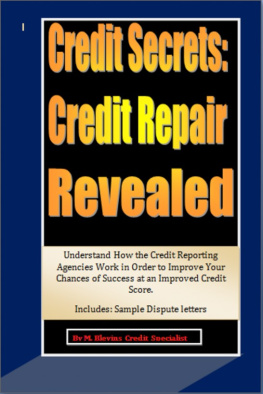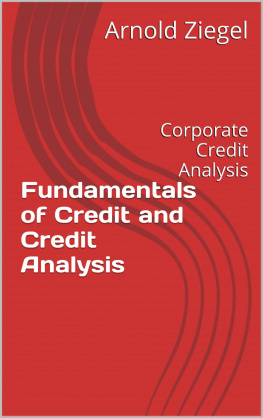Big Idea, Small Steps
The making of credit-based qualifications
Big Idea, Small Steps
The making of credit-based qualifications
Peter Wilson

2010 National Institute of Adult Continuing Education
Published by 
21 De Montfort Street
Leicester LE1 7GE
Company registration no. 2603322
Charity registration no. 1002775
www.niace.org.uk
NIACE has a broad remit to promote lifelong learning opportunities for adults. NIACE works to develop increased participation in education and training, particularly for those who do not have easy access because of class, gender, age, race, language and culture, learning difficulties or disabilities, or insufficient financial resources.
For a full listing of all NIACEs publications visit
http://shop.niace.org.uk
All rights reserved. No reproduction, copy or transmission of this publication may be made without the written permission of the publishers, save in accordance with the provisions of the Copyright, Designs and Patents Acts 1988, or under the terms of any licence permitting copying issued by the Copyright Licensing Agency.
Cataloguing in Publications Data
A CIP record for this title is available from the British Library
ISBN 978-1-86201-439-8
Designed and typeset by 4word Ltd, Bristol, UK
For Mary
Contents
Preface
In November 2008 the relevant government departments of England, Wales and Northern Ireland announced the setting up of the new Qualifications and Credit Framework (QCF). The QCF marks a significant and potentially radical change from the previous National Qualifications Framework (NQF) in these countries. This is an account of where the QCF came from, how it was made, and where it might go in the future.
Although this account takes note of the formal process of development that preceded the launch of the new Framework, it is an explicitly personal view of how the QCF came into being. It is written from the perspective of someone involved in the process of developing the QCF from inception to implementation, as well as in what might be termed the pre-history of the QCF. Indeed, it is the connection between this recent, formalised process of development and the preceding period of undocumented and unplanned activity that forms the true focus of this publication.
The title of the publication attempts to signify both the importance of the concept of credit in this story, and the long and sometimes arduous road to the creation of a system of credit-based qualifications. Although the QCF explicitly brings together both qualifications and credit in its title, it will be for others to propose an alternative conception of its development that focuses on the Q rather than the C in QCF. The assumption behind this story is that the importation of credit into the process of qualifications reform marks a significant change from previous phases of reform and establishes the opportunity to make a positive break with these previous manifestations of reform in the way that learner achievement is recognised. This is an explicitly credit-based view of credit-based qualifications.
I use the word opportunity here because it is too soon to tell whether these recent reforms have secured a permanent change in the culture of our qualifications system. Despite the potential of the QCF to deliver the usual ambitions of government for radical change, it remains to be seen whether the big idea of credit can survive and prosper in this new place between Q and F.
This is not intended to be an exhaustive chronological account of events leading to the establishing of the QCF. One of the penalties of being a participant observer in this process is that some aspects of this story loom larger than others, simply because they were witnessed at first hand. Somewhere between a comprehensively researched series of secondary texts and the privileged access to first-hand experience of some of these moments sits a balance of objective and subjective perspectives on the story of how the QCF was made. I hope the term small steps conveys an appropriately modest position of the storyteller in this account.
The idea that the QCF has been established through the collective actions of numerous people making small advances over a long period of time is reflected in a description of the development of credit systems in the United States. The author of this description Sheldon Rothblatt bemoans the fact that the story of how credit systems in the US came to be developed is lost in the mundane history of the organisations that gradually established them: The history of credits is fascinating but essentially obscure... After all, it is administrative history, a tiresome account of tiny details congealing into a system. No heroic personalities combat insurmountable odds... The story is humdrum (Rothblatt, 1991).
It is my intention that these tiny details should be recorded in some way so that this same humdrum story in the UK acknowledges at least some of the contributions occasionally by heroic personalities combating insurmountable odds made to the congealing of this thing we now refer to within the QCF as a credit system.
The piecing together of this story is an explicitly personal process. Although I have attempted to draw on a range of external sources to validate this personal perspective, it will be for the reader to decide how far the personal risks become the idiosyncratic as the text unfolds. In highlighting these fragments of the humdrum, I have followed Jorge Luis Borges view that in writing about the past we shine a torch backwards through time and select out those things that fall momentarily into the glare of our moving arc of light, that we recognise as familiar from our current viewpoint. We read Gerard Manley Hopkins differently because we are familiar with Dylan Thomas, says Borges (Borges, 1999). In this sense, all history is idiosyncratic, notwithstanding the fact that our torch falls on real moments that can be verified through evidence. If the QCF had not been developed, many of these briefly illuminated moments would have remained in darkness. I claim the privilege of the torch holder in collecting the tiny details together in a way that makes sense to me.
It is probably rare in ones professional life to be able to shine this torch back through time from such an elevated position as a formally constituted framework, secured in legislation. To have been part of both the history and what Stephen Yeo tantalisingly referred to as the pre-history (Yeo, 1998) of credit systems, as well as the making of the QCF, has been a privilege for me, but also an intellectual challenge albeit a welcome one. This experience, and the opportunity to reflect on the relationship between ideas and practice, as well as between sentiment and the reality of practical progress, forms the background to this volume; a codicil to the internal reading of events in this arcane and particular field of work that has occupied me for some 25 years.
One reason for wanting to record this congealing of tiny details is to mark the importance of individual contributions at various key points in the story. Again, I make no apology for recording these individual contributions in both the text itself and in an occasional footnote. Some of these contributions have indeed been heroic if not in the drama of the action, then in the dogged perseverance of some committed individuals in the face of often insurmountable odds. The small steps on this journey have not always been in a forward direction, but the big idea of a credit system has passed from one person to another and despite numerous diversions has finally been delivered in the form of the QCF.













